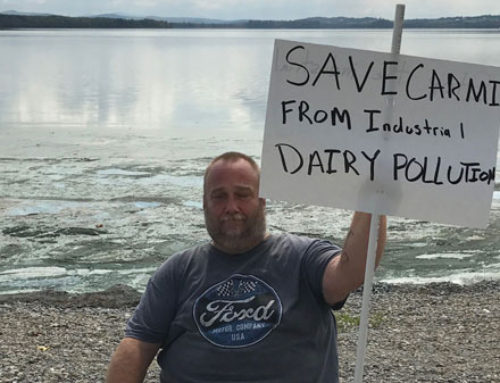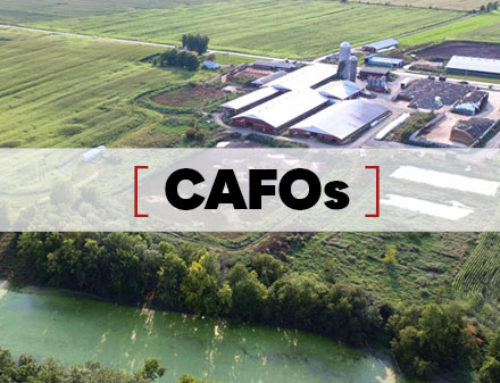Vermont’s Agency of Agriculture took what some legislators are calling “a sneaky route” in its attempts to eliminate the pesticide-usage progress reports that are required to be filed annually by the state’s Pesticide Advisory Council (VPAC).
Tucked deep in an omnibus bill addressing the viability of commissions and councils like VPAC (H.16), the Ag Agency successfully lobbied to insert language that did away with VPAC’s obligation to issue annual progress reports “with respect to the State goal of achieving an overall reduction in the use of pesticides.”
Regeneration Vermont was alerted about the effort by several lawmakers and, thereafter, filed a series of records requests from the Ag Agency and legislative committees to learn more about this underhanded effort to stymie the public’s right to know. Moreover, we issued an Action Alert to encourage the public to sound off to their legislators on the matter.
The good news — for now — is that the House Government Operations Committee took note of the public’s concerns and removed the Ag Agency’s recommended neutering of VPAC in H.16. But the bad news is that the Ag Agency is still dragging its regulatory feet and claiming that, despite the law mandating the pesticide reporting, it doesn’t have the staff or technical prowess to compile the pesticide usage data VPAC needs to do its assessments and progress reports.
The Secretary of the Ag Agency, currently Anson Tebbetts, is required to compile annual pesticide usage data and make it available to the public and VPAC, which is also supposed to use that data in its assessments of the pesticide use applications that it oversees. But neither Tebbetts nor his predecessor, Chuck Ross, has made this data available since 2013.
While keeping the public in the dark about pesticide usage patterns is one level of inappropriate, particularly with greater concerns about water contamination from the abundant use of these toxins, it’s nothing short of regulatory malpractice for VPAC to be making pesticide usage decisions without having access to this basic data.
In essence, VPAC has been flying blind while assessing the dozens of pesticide applications that have come before it since 2013. Worse, without the data informing them of usage trends, VPAC can’t fulfill its own obligations to reduce pesticide use or report on its progress. And it’s all because the Secretary of Agriculture is not fulfilling his responsibilities or following the law.
This five-year gap in pesticide-usage reporting is becoming increasingly problematic for Secretary Tebbetts, who also took two years to fill vacant “public advocate” seats on VPAC. His agency is also under increased scrutiny for “looking away” when it comes to other industrial-farm-related issues, particularly farm runoff, water quality, and antibiotic residues – both in the manure and in the farm products.
But instead of figuring out a way to meet the pesticide-reporting obligations that Agency officials had no problem meeting until 2013, Tebbetts dispatched his second in command, Deputy Secretary Diane Bothfeld, to legislatively torpedo the requirements.
Bothfeld used the Sunset Advisory Commission to get the job done, a legislatively mandated group charged with reviewing the efficacy of the more than 200 state-sanctioned commissions, task forces and panels. It’s mostly a task of weeding out the obsolete, and it’s usually about whether to “keep or kill” the panels in review.
In late November, Bothfeld testified before the Sunset Commission about the panels under the purview of the Ag Agency. While she did recommend doing away with the Sustainable Agriculture Council, Bothfeld decided to use the opportunity to amend the statutes that define and empower VPAC and the Milk Commission. And, in both cases, Bothfeld recommended to weaken reporting requirements.
RegenVt obtained the materials Bothfeld submitted to the Sunset Commission with her testimony and recommendations. In the questionnaire regarding VPAC, Bothfeld reported that, “In statute, there a (sic) requirement for a overview annual report, but it has not been done in at least a decade.”
Instead of seeking to correct VPAC’s failure to provide an annual assessment for “at least a decade,” Bothfeld sought to reward its obdurate behavior by striking the obligation it’s been ignoring from the statutes. And Bothfeld’s recommendations made it into the Sunset Commission’s proposed legislation, H.16.
Bothfeld and the Ag Agency’s attempts to rewrite the statutes in an effort to accommodate the VPAC’s unwillingness to inform the public and meet its obligations also undercut the legislative intent behind VPAC’s original formulation and empowerment. Again, there is no ambiguity with VPAC’s mission: To collect and assess pesticide usage data so as to inform the legislature, relevant agencies, and the public about the threats from these toxins, and to develop strategies to reduce pesticide use.
The bill – H.16 – was assigned to the House Operations Committee at the start of the legislative session in early January, which flagged the gutting of VPAC’s reporting obligations in its legislative summary, and ordered that “the committees of jurisdiction should be made aware of this proposed change in reporting.”
And here’s where the story ends, for now. As the next stop for H.16 was the House Natural Resources Committee, chaired by Rep. Amy Sheldon, who took testimony on the bill, listened to the public’s serious concerns about the VPAC gutting, and struck the Ag Agency’s proposed language from the bill, thus maintaining its reporting obligations.
While this victory to maintain a very precarious status quo was important, the bigger battle over enforcing pesticide data collection and assessment remains. This effort to undercut the public’s right to know by the Ag Agency should be yet another warning to Vermonters that this agency remains captured and controlled by industrial agricultural interests, thus far too willing to bend the rules in favor of its threatening practices.
Which is to say, we must remain vigilant. As such, we encourage all Vermonters to continue to contact their legislators and demand that they do what they can to enforce the rules on pesticide reporting, strengthen efforts to inform the public, and keep panel’s like VPAC true to its mission and obligations.




